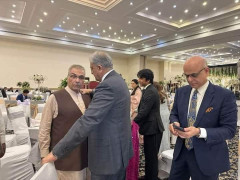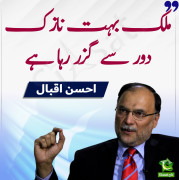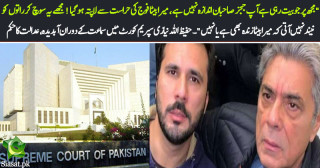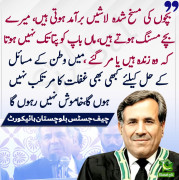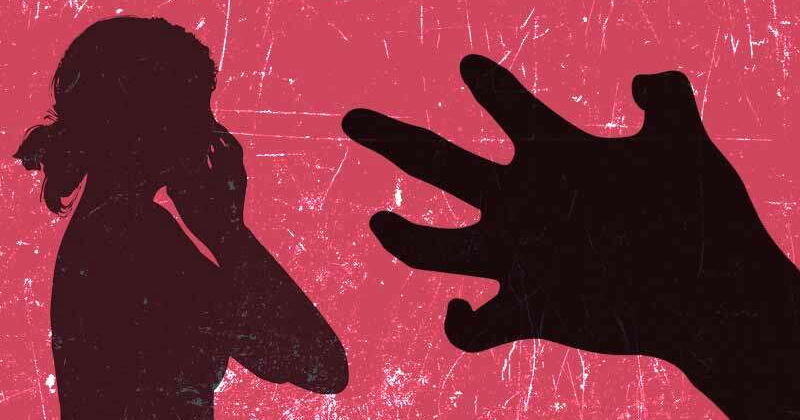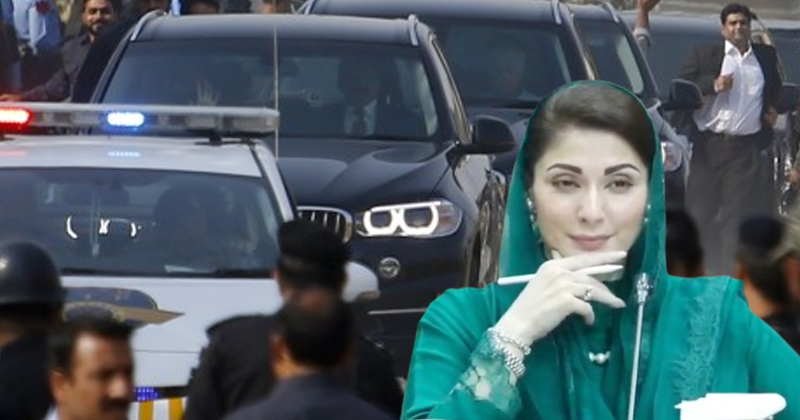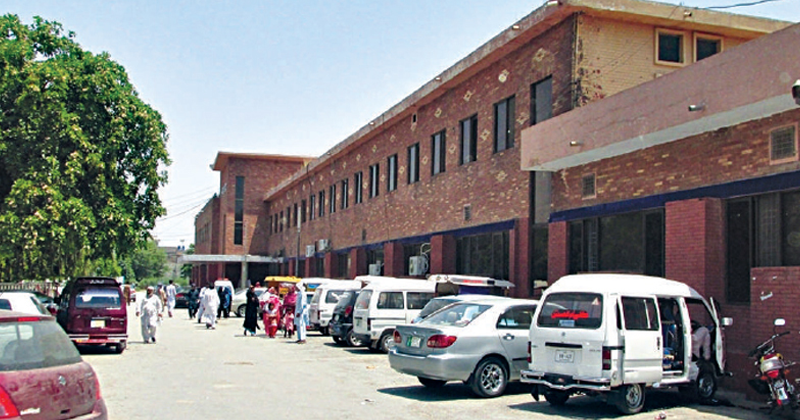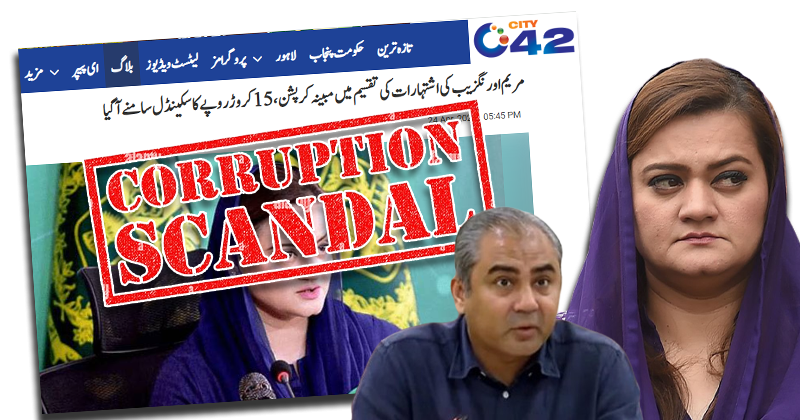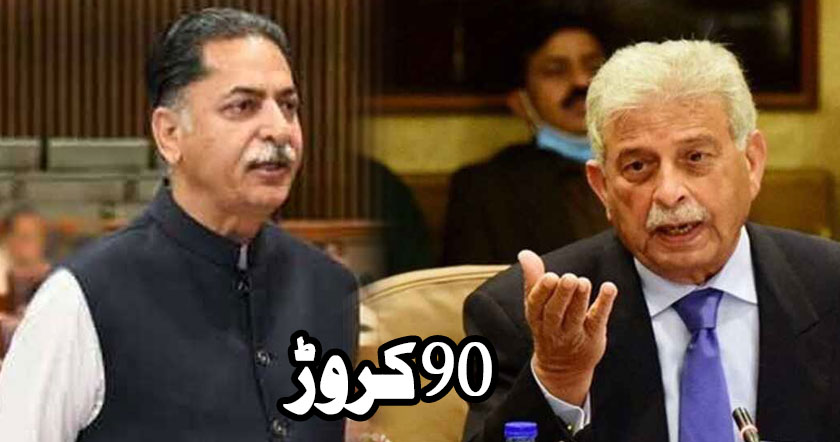Muhammad Nāṣir al-Dīn al-Albanī (1914 – October 2, 1999) was a Syrian-Albanian Islamic scholar who specialized in the fields of hadith and fiqh. For reader's convenience, I have typed below complete debate. It is a very logical thought provoking debate between a person who follows one of the four Sunni Madhabs. According to Imam Al-Albani, it is no problem that you follow the Hanafi school (for example) and follow it for a period; but if a proof comes to you from the other schools like Maliki or Hanbaki or Shafi'i, whichever is stronger, then do not oppose it due to your madhab, as such is not a religion, the religion is Allah said, the Messenger of Allah said, so follow the other opinion as long as it is stronger.
Question: Why we should not follow one madhab (school of thought), and that the unity of all these madhabs are not possible. My opinion is that these madhabs are school of thoughts from the Salaf-us-Saalih whom tried to take from Sunnah of Rasool Allah ﷺ and each of them tried their best in seeking the truth and they see their opinions as the most correct. Therefore, I believe it is upon us Muslims to take from these madhabs; and for you scholars, to unify the madhabs or have consensus in the matters that are different upon, for example, the issue of wudu, so they should have consensus on a specific opinion, and not let every layman have free rein; as I see.
As I understand from your speech, Shaykh that every person should abandon the madhabs and do Ijtihad of the Sunnah by oneself), while this is only for you scholars:
Shaykh Albani answers: May Allah pardon you, who told you that while I have been refuting the doubts of what Al-Bouti said (of me) that any Muslim person would say that a french man who just converted, that it is upon him to do Ijtehad and take from the Book and the Sunnah (directly without scholars). I say something new to you; our Lord said: "Ask the people of Dhikr (knowledge) if you do not know." Our Lord divided the Islamic society into two sections in this verse; the scholars and the non-scholars (layman). So how can you say of me which is not true. I believe in that verse and every verse that clarify issues that the Muslim differ upon; from the old and present times.
We say it is upon every Muslim to go back to the Qur'an and Sunnah; and as we were saying to our teacher before, we differentiate blind-following (of a scholar) as it is sometimes a must to blind follow a scholar, versus blindly following religiously (all the time even if it is against the truth).
This what we say. For example, you are a doctor; you wouldn't know if a prayer is correct or not; so what should you do? It is not just enough to say I am Hanafi or Shafi'i and that's it; rather ask the people of knowledge that you trust; as this is what the Qur'an tells you. And I say to you the same, we do not say it is a must for you to learn the prayer and other issues through comparative fiqh as they say today and then knowledge of Hadith, and it's terms and Usool Al-Fiqh, until you are able to say what is correct regarding (for example) what nullifies wudoo and does not. If there was a doctor who was a medical student, would it be right for him to do a surgery? Likewise, is the knowledge of Shar'iah (Islamic Legislation). So how is it logical that we say that every Muslim should open and take ruling from the Qur'an even if he be cotton picker (factory person)? So he opens and sees the verse "Or you have touched women...." (Qur'an 4:43). Is the intent in the verse meaning intercourse or just touching? How can you logically think we would say this (that one can understand this without scholars), May Allah pardon you.
Madhab Supporter: So Shaykh, it is not upon us to say we are Hanbali or Shafi'i or Maliki, rather we should do away with these school of thoughts? These are questions....
Shaykh Al_Albani: Brother, ask whatever you like; but it is not allowed to accuse us of what we are not.
Madhab Supporter: I am not accusing Shaykh, Noble Shaykh it is a must for you to be more open hearted than that. I am asking based on what I understood from what you said.
Shaykh Al_Albani: You mean, after all this you do not deem me as open hearted? Have you said beforehand, what you heard from me?
Madhab Supporter: This is what I understood.
Shaykh Al_Albani: Then you did not understand; did the people in this sitting share your understanding? Ask whatever you please now.
Madhab Supporter: In regards to madhabs, according to your speech, it is a must for a person not to say I am Shafi'i, or Maliki or hanbali etc.
Shaykh Al_Albani: What is your opinion?
Madhab Supporter: Haha, Shaykh now I am confused, before you were saying ask the people of knowledge if you do not know, I ask you; not you ask me.
Shaykh Al_Albani: Did I tell you not to ask me? Even if I ask you to ask me, would it then not be allowed to ask you? I say to you, be assured that you can ask me whatever you want, but does that mean I cannot ask you?
Madhab Supporter: No.
Shaykh Al_Albani: Then why do you detest that I ask you, I answered you and said what is your opinion.
Madhab Supporter: My opinion, is like you said, you are a person from the people of knowledge, so it is a must to take from you, as I do not know; but I am asking why (do we reject Madhab labeling etc).
Shaykh Al_Albani: What do you think Abu Layla (recorder) about his previous sayings? Oh! Doctor you are contradicting your statements, as in the beginning you were saying the scholars must do this and that. And now he is saying, it is a must to ask the people of knowledge if you do not know. Oh! Doctor, I answered saying it is not obliged (to call yourself Hanbali etc) so if you are convinced, then we continue, if you want detailed explanation, then say so.
Madhab Supporter: I just wanted to know why we should not follow the madhabs, why can't we say I am Hanafi or Maliki?
Shaykh Al_Albani: Brother, do not repeat words may Allah bless you, if you want clarification; just say yes or no. Do you know the history of the madhabs, so we may save our-self from talking (much)?
Madhab Supporter: Yes, a little.
Shaykh Al_Albani: So you know in the time of Abu Bakr (RA) and Umer (RA), Uthman (RA) and Ali (RA), there were no madhabs?
Madhab Supporter: Yes.
Shaykh Al_Albani: So if one comes and say we do not want madhabs like how it was in the first age (of Islam), is that logically correct, in your view?
Madhab Supporter: Yes.
Shaykh Al_Albani: It is not obligatory to be Hanafi or Shafi'i or Maliki or Hanbali or a Shia or Zaydi. As the (first) Muslims died before these madhabs came about; did they die as Muslim or non-Muslim? No doubt they died as Muslims, so if we died how they died, not being tied to any madhab, would we die as Muslims? So when they say it si obligatory to follow a madhab, where did they get this ruling of 'obligatory'?
Madhab Supporter: I do not know the exact wording of the Hadith, but "It is upon you to follow my Sunnah and the Sunnah of the Caliphs after me".
Shaykh Al_Albani: May Allah guide you, Doctor is this talking about Madhabs? You are forgetting that I am asking about the 4 madhabs; are the Khulafa Rashideen the madhabs?
Madhab/ Supporter: The Khulafa did not have any madhabs.
Shaykh Al_Albani: OK then, why did you bring this hadith? As long as you can understand that before the madhabs they were Muslims, pious whom died upon piety and guidance etc.
Madhab Supporter: OK, so it is not obligation on a person to be upon a specific madhab, however at the same time, this person is on one madhab, based on this I want to know , is this correct or wrong.
Shaykh Al_Albani: I am speaking about you, and you speak about the people, Oh! beloved, you yourself are not sticking to a madhab, as for sticking to a madhab being obligatory, then you are abandoning this obligation, and if you do not deem this (obligatory) as we deem you to be, then you agree with us practically and ideologically. So you should line up your practical way with your ideological way, as you contradict yourself.
Madhab Supporter: I want to ask noble Shaykh, if a person sticks to a specific madhab from the 4 madhabs, then they are tied to one of the Scholars of the Muslims, as it is not possible for the layman who does not know fiqh, to be tied to a specific madhab even if he claims he follows that madhab, he might follow 1, 2 or 3 things but not follow a madhab (as a whole).
Shaykh Al_Albani: Did I understand from the speech of the Doctor, that it is not possible for a person to be on one madhab, so he asks, is it obligatory for a person to be upon what is not possible. In my dragging old age, I am willing to sit with you until Fajr, and you may ask what you want and I will answer to my ability. But I do not care if you are convinced or not, as this convincing is not in my hand, if Allah told his Prophet "Upon you is just conveying (the message)"; so guidance is in the hands of Allah; therefore I am very open in this regard. So the thing we understand from your speech, which differs from your current situation (of not following a madhab), is that which you clarified lastly, that one practically cannot stick to one madhab, so then you ask is it obligatory to stick to a thing that is not possible? This means you not firm ideologically or in your mind (regarding this matter).
Madhab Supporter: Perhaps, I could not articulate the question enough, I say that the reality is none who hold on to a specific madhab, except the scholars of teh Muslims as they are well-versed in these madhabs.
Shaykh Al_Albani: Now, I think you have articulated it well.
Shaykh Al_Albani: Previously, we divided the Muslims society into two; we put the scholars in the first section, now you stated the scholars in the 2nd section which is the layman; however we say the scholars are the ones who make Ijtihad, but now you are saying they should stick to the madhabs, as they are the ones well-versed in it.
Madhab Supporter: Oh! teacher, these (scholars) must take (directly) from the Qur'an and Sunnah not be Hanafi or Shafi'i, these (scholars) are not like the laymen.
Shaykh Al_Albani: These scholars that are well-versed in the madhabs, are Mujtahideen, they must take from what Alalh and the Messenger ﷺ said (Qur'an and hadith), not just say I am Hanafi and my Imam said this ; only the students of knowledge say such, as for laymen then we spoke of them earlier regarding the saying of Allah "ask the people of knowledge if you don't know". The scholars when they are asked, they respond with Allah said or the Messenger ﷺ said, as for the laymen they do not say such, as this they do not know/understand, but upon them is to ask so they may understand; from whom? The scholars. As Ibn Al-Qayyim (may Allah have mercy on him) said in a beautiful poem regarding what is knowledge: "Knowledge is Allah said, His Messenger said, this is not concealed (it is obvious). What is knowledge when you differ foolishly between the Prophet and the opinion of a Jurist". We know this well, when we say: " Brother, the Prophet said this, they reply with, my madhab says this". This is taking a madhab as a religion that is not allowed, as you go against what Allah and his Messenger ﷺ said due to what? Due to what your madhab says. If one does not know, then such is a calamity (مصیبت), and if one knows then it is greater (calamity), as any scholar rejects and does not take an ayah or hadith due to his madhab, then what a calamity it is? Oh! student of knowledge/fiqh, it is no problem that you follow the Shafi'i school (for example) and follow it for a period; but if a proof comes to you from the other schools like Maliki or Hanbaki or Hanafi whichever is stronger, then do not oppose it due to your madhab, as such is not a religion, the religion is Allah said, the Messenger of Allah said, so follow the other opinion as long as it is stronger. This is what we teach the students of Shariah (Islamic law).
Question: Why we should not follow one madhab (school of thought), and that the unity of all these madhabs are not possible. My opinion is that these madhabs are school of thoughts from the Salaf-us-Saalih whom tried to take from Sunnah of Rasool Allah ﷺ and each of them tried their best in seeking the truth and they see their opinions as the most correct. Therefore, I believe it is upon us Muslims to take from these madhabs; and for you scholars, to unify the madhabs or have consensus in the matters that are different upon, for example, the issue of wudu, so they should have consensus on a specific opinion, and not let every layman have free rein; as I see.
As I understand from your speech, Shaykh that every person should abandon the madhabs and do Ijtihad of the Sunnah by oneself), while this is only for you scholars:
Shaykh Albani answers: May Allah pardon you, who told you that while I have been refuting the doubts of what Al-Bouti said (of me) that any Muslim person would say that a french man who just converted, that it is upon him to do Ijtehad and take from the Book and the Sunnah (directly without scholars). I say something new to you; our Lord said: "Ask the people of Dhikr (knowledge) if you do not know." Our Lord divided the Islamic society into two sections in this verse; the scholars and the non-scholars (layman). So how can you say of me which is not true. I believe in that verse and every verse that clarify issues that the Muslim differ upon; from the old and present times.
We say it is upon every Muslim to go back to the Qur'an and Sunnah; and as we were saying to our teacher before, we differentiate blind-following (of a scholar) as it is sometimes a must to blind follow a scholar, versus blindly following religiously (all the time even if it is against the truth).
This what we say. For example, you are a doctor; you wouldn't know if a prayer is correct or not; so what should you do? It is not just enough to say I am Hanafi or Shafi'i and that's it; rather ask the people of knowledge that you trust; as this is what the Qur'an tells you. And I say to you the same, we do not say it is a must for you to learn the prayer and other issues through comparative fiqh as they say today and then knowledge of Hadith, and it's terms and Usool Al-Fiqh, until you are able to say what is correct regarding (for example) what nullifies wudoo and does not. If there was a doctor who was a medical student, would it be right for him to do a surgery? Likewise, is the knowledge of Shar'iah (Islamic Legislation). So how is it logical that we say that every Muslim should open and take ruling from the Qur'an even if he be cotton picker (factory person)? So he opens and sees the verse "Or you have touched women...." (Qur'an 4:43). Is the intent in the verse meaning intercourse or just touching? How can you logically think we would say this (that one can understand this without scholars), May Allah pardon you.
Madhab Supporter: So Shaykh, it is not upon us to say we are Hanbali or Shafi'i or Maliki, rather we should do away with these school of thoughts? These are questions....
Shaykh Al_Albani: Brother, ask whatever you like; but it is not allowed to accuse us of what we are not.
Madhab Supporter: I am not accusing Shaykh, Noble Shaykh it is a must for you to be more open hearted than that. I am asking based on what I understood from what you said.
Shaykh Al_Albani: You mean, after all this you do not deem me as open hearted? Have you said beforehand, what you heard from me?
Madhab Supporter: This is what I understood.
Shaykh Al_Albani: Then you did not understand; did the people in this sitting share your understanding? Ask whatever you please now.
Madhab Supporter: In regards to madhabs, according to your speech, it is a must for a person not to say I am Shafi'i, or Maliki or hanbali etc.
Shaykh Al_Albani: What is your opinion?
Madhab Supporter: Haha, Shaykh now I am confused, before you were saying ask the people of knowledge if you do not know, I ask you; not you ask me.
Shaykh Al_Albani: Did I tell you not to ask me? Even if I ask you to ask me, would it then not be allowed to ask you? I say to you, be assured that you can ask me whatever you want, but does that mean I cannot ask you?
Madhab Supporter: No.
Shaykh Al_Albani: Then why do you detest that I ask you, I answered you and said what is your opinion.
Madhab Supporter: My opinion, is like you said, you are a person from the people of knowledge, so it is a must to take from you, as I do not know; but I am asking why (do we reject Madhab labeling etc).
Shaykh Al_Albani: What do you think Abu Layla (recorder) about his previous sayings? Oh! Doctor you are contradicting your statements, as in the beginning you were saying the scholars must do this and that. And now he is saying, it is a must to ask the people of knowledge if you do not know. Oh! Doctor, I answered saying it is not obliged (to call yourself Hanbali etc) so if you are convinced, then we continue, if you want detailed explanation, then say so.
Madhab Supporter: I just wanted to know why we should not follow the madhabs, why can't we say I am Hanafi or Maliki?
Shaykh Al_Albani: Brother, do not repeat words may Allah bless you, if you want clarification; just say yes or no. Do you know the history of the madhabs, so we may save our-self from talking (much)?
Madhab Supporter: Yes, a little.
Shaykh Al_Albani: So you know in the time of Abu Bakr (RA) and Umer (RA), Uthman (RA) and Ali (RA), there were no madhabs?
Madhab Supporter: Yes.
Shaykh Al_Albani: So if one comes and say we do not want madhabs like how it was in the first age (of Islam), is that logically correct, in your view?
Madhab Supporter: Yes.
Shaykh Al_Albani: It is not obligatory to be Hanafi or Shafi'i or Maliki or Hanbali or a Shia or Zaydi. As the (first) Muslims died before these madhabs came about; did they die as Muslim or non-Muslim? No doubt they died as Muslims, so if we died how they died, not being tied to any madhab, would we die as Muslims? So when they say it si obligatory to follow a madhab, where did they get this ruling of 'obligatory'?
Madhab Supporter: I do not know the exact wording of the Hadith, but "It is upon you to follow my Sunnah and the Sunnah of the Caliphs after me".
Shaykh Al_Albani: May Allah guide you, Doctor is this talking about Madhabs? You are forgetting that I am asking about the 4 madhabs; are the Khulafa Rashideen the madhabs?
Madhab/ Supporter: The Khulafa did not have any madhabs.
Shaykh Al_Albani: OK then, why did you bring this hadith? As long as you can understand that before the madhabs they were Muslims, pious whom died upon piety and guidance etc.
Madhab Supporter: OK, so it is not obligation on a person to be upon a specific madhab, however at the same time, this person is on one madhab, based on this I want to know , is this correct or wrong.
Shaykh Al_Albani: I am speaking about you, and you speak about the people, Oh! beloved, you yourself are not sticking to a madhab, as for sticking to a madhab being obligatory, then you are abandoning this obligation, and if you do not deem this (obligatory) as we deem you to be, then you agree with us practically and ideologically. So you should line up your practical way with your ideological way, as you contradict yourself.
Madhab Supporter: I want to ask noble Shaykh, if a person sticks to a specific madhab from the 4 madhabs, then they are tied to one of the Scholars of the Muslims, as it is not possible for the layman who does not know fiqh, to be tied to a specific madhab even if he claims he follows that madhab, he might follow 1, 2 or 3 things but not follow a madhab (as a whole).
Shaykh Al_Albani: Did I understand from the speech of the Doctor, that it is not possible for a person to be on one madhab, so he asks, is it obligatory for a person to be upon what is not possible. In my dragging old age, I am willing to sit with you until Fajr, and you may ask what you want and I will answer to my ability. But I do not care if you are convinced or not, as this convincing is not in my hand, if Allah told his Prophet "Upon you is just conveying (the message)"; so guidance is in the hands of Allah; therefore I am very open in this regard. So the thing we understand from your speech, which differs from your current situation (of not following a madhab), is that which you clarified lastly, that one practically cannot stick to one madhab, so then you ask is it obligatory to stick to a thing that is not possible? This means you not firm ideologically or in your mind (regarding this matter).
Madhab Supporter: Perhaps, I could not articulate the question enough, I say that the reality is none who hold on to a specific madhab, except the scholars of teh Muslims as they are well-versed in these madhabs.
Shaykh Al_Albani: Now, I think you have articulated it well.
Shaykh Al_Albani: Previously, we divided the Muslims society into two; we put the scholars in the first section, now you stated the scholars in the 2nd section which is the layman; however we say the scholars are the ones who make Ijtihad, but now you are saying they should stick to the madhabs, as they are the ones well-versed in it.
Madhab Supporter: Oh! teacher, these (scholars) must take (directly) from the Qur'an and Sunnah not be Hanafi or Shafi'i, these (scholars) are not like the laymen.
Shaykh Al_Albani: These scholars that are well-versed in the madhabs, are Mujtahideen, they must take from what Alalh and the Messenger ﷺ said (Qur'an and hadith), not just say I am Hanafi and my Imam said this ; only the students of knowledge say such, as for laymen then we spoke of them earlier regarding the saying of Allah "ask the people of knowledge if you don't know". The scholars when they are asked, they respond with Allah said or the Messenger ﷺ said, as for the laymen they do not say such, as this they do not know/understand, but upon them is to ask so they may understand; from whom? The scholars. As Ibn Al-Qayyim (may Allah have mercy on him) said in a beautiful poem regarding what is knowledge: "Knowledge is Allah said, His Messenger said, this is not concealed (it is obvious). What is knowledge when you differ foolishly between the Prophet and the opinion of a Jurist". We know this well, when we say: " Brother, the Prophet said this, they reply with, my madhab says this". This is taking a madhab as a religion that is not allowed, as you go against what Allah and his Messenger ﷺ said due to what? Due to what your madhab says. If one does not know, then such is a calamity (مصیبت), and if one knows then it is greater (calamity), as any scholar rejects and does not take an ayah or hadith due to his madhab, then what a calamity it is? Oh! student of knowledge/fiqh, it is no problem that you follow the Shafi'i school (for example) and follow it for a period; but if a proof comes to you from the other schools like Maliki or Hanbaki or Hanafi whichever is stronger, then do not oppose it due to your madhab, as such is not a religion, the religion is Allah said, the Messenger of Allah said, so follow the other opinion as long as it is stronger. This is what we teach the students of Shariah (Islamic law).


